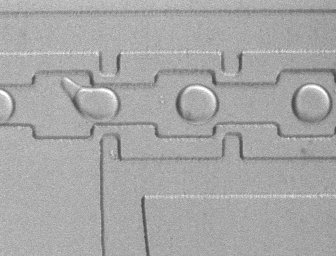THE CHALLENGE
A major challenge in single-cell DNA methylation profiling lies in the inefficiency and high cost of current methods, which rely on labor-intensive, plate- or tube-based workflows that are difficult to scale. These traditional approaches not only require multiple manual steps and expensive reagents but also suffer from significant DNA loss and degradation during bisulfite conversion, a chemically harsh process essential for detecting methylation. As a result, experiments are typically limited to processing a few hundred cells at a time, making large-scale studies time-consuming and costly. While droplet microfluidics has revolutionized other single-cell assays like RNA-seq by enabling high-throughput processing and cost savings, applying it to bisulfite sequencing remains technically complex due to issues with DNA stability, barcoding accuracy, and reaction efficiency within droplets. Overcoming these obstacles is critical for delivering a scalable, cost-effective platform that can unlock the full potential of epigenetic insights in areas like cancer diagnostics, neuroscience, and precision medicine.
OUR SOLUTION
We offer a breakthrough droplet-based microfluidic platform that dramatically improves the speed, scale, and cost-efficiency of single-cell DNA methylation profiling. Unlike traditional, slow, and expensive plate-based methods, this new assay automates and miniaturizes the process within microscopic droplets, reducing DNA loss and enabling high-quality data from up to 10,000 individual cells in just two days. We cut reagent costs, minimize manual labor, and deliver reproducible, high-resolution methylation data. This scalable, sequencing-ready workflow offers a commercially viable path for large-scale epigenomic studies in fields like cancer research, neuroscience, and personalized medicine.

Figure: Microscale droplets in a high-throughput device.
Advantages:
- Continuously tunable temporal irregularity via a single regularity parameter.
- Multi-modal stimulation compatibility with electrical, magnetic, optical, and ultrasonic systems.
- Real-time adaptive stimulation can be adjusted to produce the desired neural response kinetics.
- Clinically validated personalization for conditions like mTBI, enabling targeted LTP/LTD modulation.
Potential Application:
- High-throughput single-cell methylome profiling for drug screening
- Personalized cancer diagnostics using DNA methylation signatures
- Scalable epigenetic services for biotech and academic research
- Single-cell analysis of developmental and disease epigenetics